What happens when you die cashless and alone
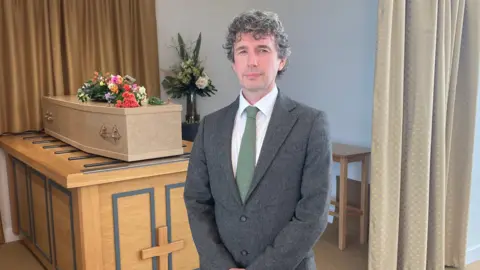 BBC/Amy Walker
BBC/Amy WalkerA melancholic composition by Brahms plays as four formally dressed pallbearers, unknown to the deceased, carry a chipboard coffin to its platform in a crematorium.
Among the many rows of empty seats sit a care worker and two distant friends.
Funeral celebrant Martin Ellis then leads a 15-minute committal service about a 96-year-old man whose life he knows scant details of.
He tells the few attendees that while the compassion they feel for Charles is "perhaps not as strong or as deep as love", it is still "marked by the fact that his life and his presence in this world matters".
The service is a public health funeral - or 'pauper's funeral' - arranged by Wealden District Council in East Sussex.
The duty falls on a local authority where a family are unable to pay or cannot be traced.
Figures obtained by the BBC show that the number of public health funerals carried out by councils in the South East (Sussex, Surrey and Kent) rose by 49% between 2019 and 2023, from 230 to 342.
A recent report on the cost of dying from insurer SunLife also found that 27% of the more than one in 10 funeral directors who provide public health funerals in the UK had seen an increase in the number taking place in the past year.
Mr Ellis admits that preparing a eulogy for these services can be difficult.
"If I'm fortunate, I'll get to speak to friends and family about their stories and memories," he says.
"In other circumstances, we know literally nothing about the person."
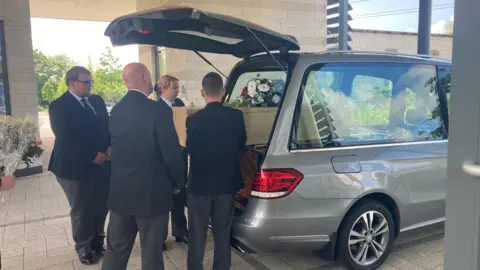 BBC/Amy Walker
BBC/Amy WalkerTo prepare for today, he has spoken to Charles' wife, who has long been separated from him, is in her 90s and suffering from the effects of dementia, as well as staff at the care home.
In his speech, Mr Ellis talks about the fact Charles was in a care home for the last "six months or so", was born in Littlehampton in 1927, spent some time in the Royal Navy and worked as a salesman for a double-glazing firm.
Better known as 'Charlie', he was once a regular at local pubs, where he was "well known and liked" and the thing that seemed to bring him out of himself at the care home was a visiting Labrador named Ally, Mr Ellis tells the attendees.
The reason he is having a public health funeral is because he did not have enough money to cover the costs and was estranged from his family.
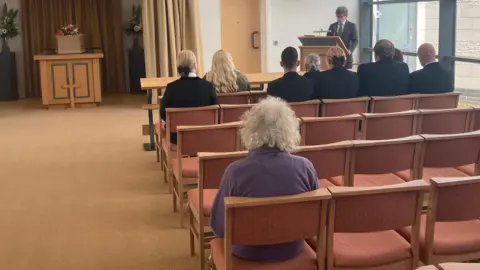 BBC/Amy Walker
BBC/Amy Walker"We might not have many tales about the person's life, we might not know much about them, but we still... put together a dignified and respectful service," says Mr Ellis.
Sometimes, no-one shows up for the public health funerals held at Wealden Crematorium.
Instead, Mr Ellis addresses the funeral director, the pallbearers and the council officer who arranges them.
Even in those circumstances, Mr Ellis believes it is important to "mark a person's life".
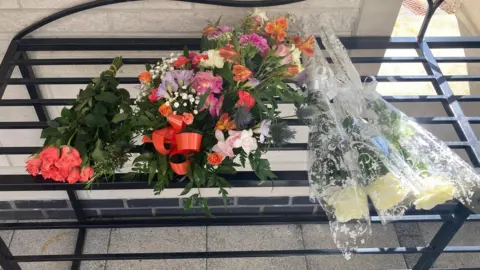 BBC/Amy Walker
BBC/Amy Walker"It's obviously very difficult. It's different addressing your colleagues rather than friends or family," he says.
"I try to treat it as much like a typical service as I can."
The difficulty is echoed by funeral director Rhia Carter, from Haine & Son in Hailsham, which carries out funerals on behalf of the council.
In some cases, she says, they have no knowledge of the deceased's wishes.
"It can be upsetting at times," she says.
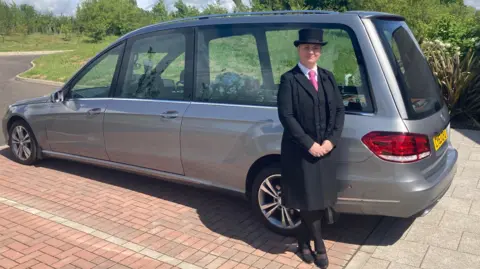 BBC/Amy Walker
BBC/Amy WalkerChristina Martin, a technical support officer for Wealden whose job it is to organise the funerals, says the increase is being driven by a "lack of funds".
"I think the cost-of-living crisis has become the cost-of-dying crisis," she says.
The 15-minute committal service that Wealden offers is not universal, with some councils opting for direct cremations without a service.
But with many cash-strapped councils cutting services, Ms Martin fears that more councils may reach a point where they have to reduce their offer due to a fall in the amount of money they have been able to recoup.
Data from 32 out of 35 responsible councils, shows the amount they spent on funerals between 2019 and 2023 jumped from about £322,000 to £446,000.
While authorities can claim back the costs of a public health funeral from the deceased's estate, the amount councils in the South East have been able to recover has barely risen despite an increase in funerals.
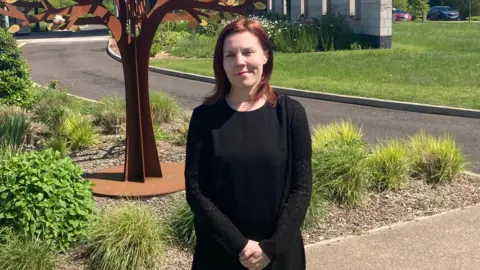 BBC/Amy Walker
BBC/Amy Walker"My big concern is that the service will be seen as surplus," she says.
The effect, she believes, could be profound at a time when bills are still rising.
"People think they're for a certain type of person, very poor or sad and lonely, but they could be for anyone," she adds.
"We're all one or two circumstances away from dying on our own."
"I think knowing that your funeral will [still] take place and your life will be spoken of is quite a comfort and the right thing to do."
Wealden District Council said it has always tried to "inform friends and family about the funeral, so they can attend".
"A council officer always attends. We consider this to be good practice," it added.
Follow BBC Sussex on Facebook, on X, and on Instagram. Send your story ideas to [email protected] or WhatsApp us on 08081 002250.
